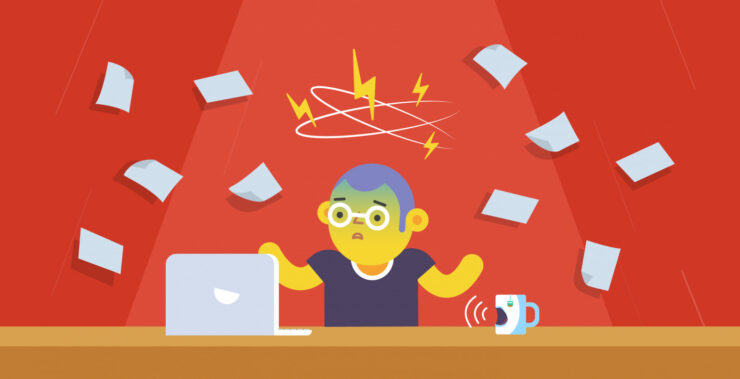A workplace can be a great place to be – exciting, rewarding, and productive. But it can also be a real drain on your mental health and stress levels. If you don’t address it, it can even lead to a mental breakdown at work. The demands of modern work life, with its constant pressure to perform and meet deadlines, can quickly leave employees feeling mentally and emotionally drained.
A mental breakdown at work is usually down to stress, a lack of support, and high-pressure situations. It can show up in different ways, so it’s important to spot the early signs of a mental breakdown to stop it getting worse. Mental health issues like burnout or emotional fatigue can have a big impact on an employee’s well-being and performance, which in turn affects the overall productivity and culture of the workplace.
If these mental health issues aren’t addressed, they can lead to more serious problems like panic attacks, emotional instability, or even withdrawal from work. Knowing what to look for and being aware of the signs can help employers and managers spot when someone’s struggling. It’s really important to get help for people as soon as you can, so they can get back to feeling good and doing well at work.
In this article, we’ll look at the signs that someone might be having a mental breakdown at work, how managers and organizations can support their employees before it gets out of hand, and what to do if someone is having a mental breakdown. If you spot the signs early and take action, you can stop an employee from reaching breaking point.
What does mental state mean?
A mental state is a psychological condition of our minds that most people can easily determine. For example, when you are happy, your mental state is most likely joyful. On the contrary, if you are feeling sad, your mental state is most likely downhearted.
However, our mental state is usually very dynamic and an average person feels a varied number of emotions throughout their life that alter their mental state from time to time. Having said that, some people might be in a constant mental state of exhaustion. This can be a sign of a mental breakdown. But let’s first discuss what a mental breakdown means.
What is a mental breakdown?
Mental breakdowns are associated with changes in a person’s mood, experiencing mental anguish, mental exhaustion, or even a mental block. And, while it may be difficult to discuss, an estimated 54 million Americans each year encounter signs related to mental health difficulties.
These challenges – ranging from anxiety and depression to emotional fatigue – can impact every part of life, from personal relationships to work performance and overall well-being. A breakdown is often the result of prolonged emotional and psychological stress, leaving a person feeling overwhelmed, disconnected, and drained.
In the workplace, such crises often stem from sustained pressure, burnout, or lack of support. At that stage, individuals may feel detached, hopeless, or unable to function as they once did.
Understanding what leads to this kind of collapse is the first step toward prevention. By addressing the root causes early and fostering an environment that prioritizes mental health, employers and colleagues can help reduce the risk and create a safer, more supportive workspace.
Mental breakdown symptoms
If you think your employee has a mental health crisis, it’s critical to react quickly. Early intervention and emotional support are vital for the employee’s wellness. It may be time to act if you detect one or more of these signs:
Panic attacks
Recurrent panic episodes might be a sign of escalating mental breakdown concerns. While many individuals describe the sensation as acute panic followed by alienation from reality and breathing difficulties, the majority of the signs are physiological. This means that taking relevant medication can help in relieving many of these mental breakdown symptoms, as well as the constant struggle of physical problems that feed into and intensify mental breakdowns.
Mental blocks
Have you been making a lot of mistakes lately? An apparent lack of attention to detail, from forgetting your simple day-to-day report-making tasks to not being able to perform the normal easily done tasks, or being in a state of mental exhaustion may be a sign of burnout or a mental block. When you’re having trouble remembering things or focusing on daily duties, you can try to use a time tracking tool, such as Toggl, or alternatives to Toggl to reduce your stress levels to feel less overwhelmed or distracted.
Emotional lability
Emotional lability is also referred to as having mood swings. It’s not easy to feel helpless in the face of unpredictable moods and emotions. Whether it’s a surge of anger, sorrow, or depression, it could be an indication of a significant underlying mental health problem such as a mental breakdown problem, which necessitates help and attention.
Mental fatigue
If you have been feeling extremely overwhelmed even with the easiest of tasks or are in a state of mental exhaustion then chances are you are mentally fatigued. This can lead to various other emotions that lead to a mental breakdown such as feeling anxious, languishing, and not having the energy to do simple things – let alone major tasks at work.
Mental anguish
You’ve worked hard to establish yourself in your chosen area, so why are you now questioning whether what you’re doing is worthwhile? Burnout is characterized by a mistaken sense of “diminished achievement,” which can affect anyone who has been working too hard, from doctors to great athletes. As a way of dealing with the continuous demands of your job, your mind begins to play tricks on you. This can result in many people having mental anguish at work.
Mental gymnastics
This happens when our minds spiral into damaging patterns of thought when we make up explanations or reasoning for unacceptable actions or circumstances. So basically, they’re all the notions that are in your head that are preventing you from accomplishing what you need to do. Instead of just taking the bullet and finishing your job, you may start to have second thoughts such as: “What if I am unable to complete this project on time?” “What if I am not the right person for this project?” “What if I don’t understand it?”
How long does a mental breakdown last?
A mental breakdown at a workplace can last anywhere from a minute to a week depending on person to person.
Because mental breakdown is not a recognized medical illness, no established length of time validates how long it may last.
However, several risk indicators might lead to a longer mental breakdown, and the more an employee has, the higher the danger. These are some of them:
- Unwillingness to give up control or transfer authority
- An untreated mental health problem
- Using substances as a coping mechanism
- Overburdened with tasks at work or home
- Neglecting one’s health, such as sanitation, food, or fitness
- Traumatic events such as assault, death, or life-threatening diseases
When to seek emotional support?
One of the most frequent reasons for an employee’s absence from work is a mental breakdown or other related symptoms. The repercussions of a mental breakdown can reduce profitability and productivity at a workplace, as well as cause unhappiness and mental exhaustion within the culture of an organization.
Moreover, your employee’s mental health has a great impact on your organization’s growth and success. Mental health problems can make a person feel agitated, have heightened emotional lability, be mentally fatigued, face a mental block, be mentally anguished, frightened, and more.
What to do if someone is having a mental breakdown?
Managers within an organization should always have a vision for making a safe workplace for everyone including themselves. Managers can help establish the trust of the employees by integrating practices that recognize workers’ anxieties and resolve or minimize some of their problems.
1. Check-ins on a one-on-one basis
Managers should speak with each of their team members one-on-one at least once a week. This is not the same as taking a minute at the beginning of a face-to-face or online meeting to inquire about everyone’s well-being.
Employees should be motivated to discuss the constraints of their tasks, burdens, safety issues, or any personal problems during this one-on-one session. Sometimes, employees have no one to talk to outside their work life, and doing simple sessions like these can help boost their mental health and get them talking about it.
2. Go for regular self-care sessions
Self-care is very important for both our emotional and physical health. However, for employees who are already overworked or suffer from presenteeism, finding time to do something for themselves may seem difficult at first. On the other hand, managers can encourage their teams to indulge in self-care practices or even give employees vouchers to go for such activities as a spa or massage voucher.
From a simple early morning run to a good healthy meal, or getting a good 8 hours of uninterrupted sleep can help alleviate your mental health and prevent you from experiencing mental breakdowns. Managers can even invite yoga practitioners to the workplace and motivate employees to have a 15-minute session before work starts.
3. Go for therapy sessions
In many areas, going for therapy is still considered a stigma. The taboo attached to going to therapy because “something is wrong with you” will only take you down the road of a breakdown. Going for therapy and seeking emotional support can help mediate your mental breakdown and prevent you from losing your job or peace at work.
It’s normal to feel down or have a mental breakdown – but it’s not normal to not seek emotional support.
4. Peer support
Connecting with others who are on similar paths can help you lessen social exclusion, eliminate embarrassment, and understand how to re-engage with the community as your mental health improves. It’s also a wonderful approach to offer you hope for the future and motivate you to work harder to achieve your objectives.
5. Seek permission to work from home
If your job is such that you can easily manage your workload from home and think that your work environment is causing you a mental breakdown, then it is more likely that you seek permission for it. Sometimes, a simple talk with your boss can help save you from a lot of unwanted situations.
At times, we feel like we shouldn’t talk to our boss for fear of how they may perceive us – but at the end of the day, you should also think about your mental well-being because that’s what will help you complete your tasks more efficiently.
On the other hand, employers should always keep in mind that employees working in an organization are critical to their success. If their happiness is regarded, they will generate better results for the organization in return.
6. Do not compare yourself with others
It’s easy to get caught up in a corporate culture that values certain types of performatives over others. If your colleagues can sit for five hours straight and work productively, don’t try to do the same. You might be different in a way that you require small and regular breaks throughout to avoid getting burnt out and produce better results. Do not compare yourself or your productivity with others because everyone is different in how they work.
7. Take breaks
It’s critical to strike a healthy work-life harmony, whether you work physically or remotely. This entails taking frequent breaks throughout the day and turning off your screens at the end of the workday. Instead of being available 24 hours a day to reply to business calls, emails, or other communications, it’s more vital to spend time with friends and family and rest, rejuvenate, and enjoy yourself.
How to reduce mental health issues in the workplace?
Mental health in the workplace is not something that should be addressed only when an issue arises. It must be actively promoted and a supportive, stress-reducing environment created in advance to prevent it from escalating. Here are some effective strategies for reducing mental health issues in the workplace:
Foster open communication
Open dialogue about mental health is the key to reducing workplace stress. Encourage your employees to talk. Create a culture where mental health is not stigmatized and employees feel comfortable discussing their challenges. Regular check-ins, one-to-one meetings, and anonymous surveys must be provided to give employees a safe space to express concerns without fear of judgment. When employees know they can communicate openly, they will seek help early and avoid reaching a breaking point.
Encourage work-life balance
It is crucial to maintain clear boundaries between work and personal life to prevent mental fatigue. Workers must set clear boundaries, such as taking breaks, leaving work at work, and disconnecting from work-related communications after hours. Offering flexible work hours, the ability to work from home, or even a compressed workweek is an effective way to help employees manage their time better and reduce the feeling of being overwhelmed.
Provide mental health resources and support
Employers must offer access to mental health resources such as Employee Assistance Programs (EAPs), counseling services, or workshops that focus on stress management, mindfulness, and emotional well-being. Make it clear to your employees that you care about their well-being by offering mental health days or paid time off specifically for mental health care. Furthermore, inviting mental health experts to speak or providing training on coping mechanisms will equip employees with the tools to manage their own mental health.
Set realistic expectations and provide support
Avoid overwhelming workloads, as they are a common trigger for mental health issues in the workplace. Set clear, achievable goals and ensure that workloads are manageable. It is essential to regularly assess how much employees are expected to handle and provide support if necessary. This could include delegating tasks, hiring additional staff, or re-evaluating project deadlines. Training in time management and stress-relief techniques will help employees feel more in control of their workload.
Create a supportive team environment
A positive and supportive work culture is the best way to prevent mental health issues. Encourage teamwork and collaboration. Make sure your employees can rely on each other for support during difficult times. Implementing a buddy system or peer support network is an effective way to help employees feel more connected and less isolated. When teams have a culture of empathy and understanding, it’s easier for employees to lean on each other and share coping strategies.
Monitor and address workplace stressors
While stress is inevitable in most work environments, it is crucial to identify and address workplace stressors before they become overwhelming. Regularly assess workplace culture, workload distribution, and environmental factors that could contribute to stress. By addressing the root causes of stress, such as poor management practices, unclear expectations, or unhealthy office dynamics, you can create a healthier, more balanced work environment for all employees.
Reducing mental health issues in the workplace is a simple process. Create a supportive environment where employees feel comfortable. Offer resources, promote work-life balance, and address stressors early. This is the only way to help your team stay healthy and engaged. A happy, healthy workforce is a more productive one.
Prioritizing your mental health for a better future
Personal assistance and employee education are important, but they will have limited impact if employers do not also work to reduce or eliminate workplace stressors and mental exhaustion.
Companies must develop a long-term strategy to ensure they have the right resources in place to support team members who may face anxiety, stress, or even burnout in the future.
Leaders owe it to their people to create a culture that protects both physical and emotional well-being. After all, when the human side of work collapses under pressure, productivity, creativity, and growth soon follow. Taking care of your employees’ mental health isn’t just compassion – it’s a commitment to a healthier, more resilient future..









Add comment